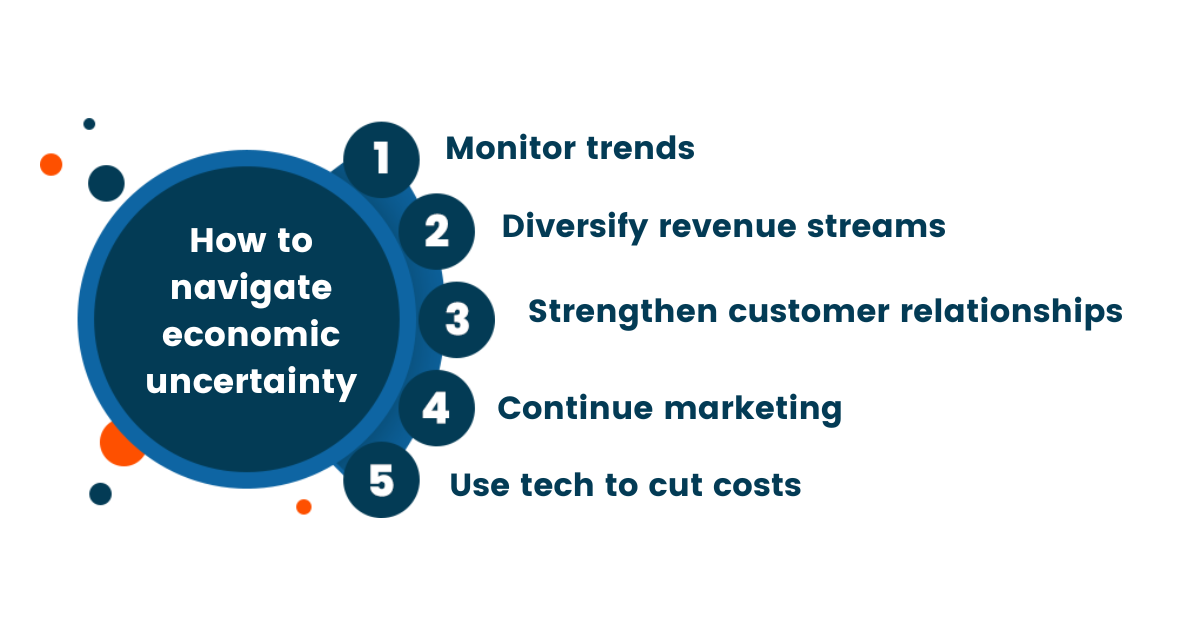
Today’s CEOs believe there’s a 24 percent likelihood that their companies will be exposed to macroeconomic volatility in the next 12 months. Business leaders also believe that there’s a 24 percent chance inflation will be a key threat to their companies during the same period.
An economic downturn has been a looming threat for businesses over the last few years. From the pandemic and supply chain issues to geopolitical conflicts, several factors have contributed to a feeling of uncertain times and a shaky economic climate.
While times of economic uncertainty affect every company, small business entrepreneurs are often hit hard. In this article, we’ll dig deeper into the impact of economic uncertainties on small businesses and discuss strategies to deal with them. Let’s get started.
The impact of economic uncertainty on SMBs
When the global economy declines, inflation and interest rates spike, which, in turn, curb purchasing power. In other words, most businesses will see a drop in sales and revenue during such periods, resulting in cash flow challenges.
It’s also worth keeping in mind that funding from investors dries up during such periods. For instance, worldwide VC funding plunged to $344 billion in 2023, reaching the lowest level since 2019. This makes it even tougher for small businesses to stay afloat.
Economic uncertainty also brings other setbacks, such as supply chain disruptions and regulatory changes. Given that most small businesses are already cash-strapped, it becomes even more challenging to cater to changing customer needs and drive sales.
Navigating economic uncertainty and overcoming sales challenges

Fluctuations in the global economy during tough times aren’t a death sentence for your company. There are ways to build your customer base and generate revenue despite an economic slowdown.
Here are a few strategies to help you get started.
1. Monitor market trends
First things first—if you want your business to sail unscathed through economic downturns, you must embrace a proactive approach. That involves staying on top of changing market trends and consumer demands and preferences.
Keeping up with trends will give you deeper insight into how purchase habits shift with economic fluctuations. That, in turn, will help you make the right decisions regarding product development and pricing and adapt your sales tactics.
Conduct online surveys, social media polls, and customer interviews to dig deeper into their changing expectations and needs.
A CRM platform can also help you track changes in the behavior of existing customers and prospects. You can use detailed customer profiles available on Act! to monitor their purchase history and recent customer service interactions. It’ll help you identify trends in their preferences and sentiments.
Additionally, use tools like Google Trends to understand where consumer preferences in your industry are headed. Competitor analysis and social listening tools can also come in handy.
2. Diversify revenue streams
The next step is to tap into alternative revenue streams by diversifying your product/service offerings. It becomes easier if you already have a finger on the pulse of your customer base.
For instance, let’s say you run a company that sells nutritional supplements online. As inflation rates spike, you might observe consumer interest in your products plummeting. However, interacting with your customer base might reveal that they’re keen to learn more about affordable and healthy eating.
You can consider partnering with expert nutritionists to offer consultations on your website. Also, you could launch a range of paid online workshops for people who want more in-depth insights. Upselling your products at these events can generate even more revenue.
The key is to stay agile and be open to modifying your business model as consumer mindsets change.

3. Strengthen existing customer relationships
If you run a small business, you already know that retention is more cost-effective than acquiring a new customer. When you’re navigating economic uncertainty, it only makes sense to double down on existing customer relationships.
It could be as simple as staying connected with existing customers via email and social media. Highlight the challenges your business is facing and the steps your team is taking to overcome them. You could even ask them to share their ideas on navigating these challenges. It’s an excellent way to show how you value them and build stronger relationships.
A CRM solution like Act!, with its integrated marketing automation features, can come in handy for streamlining communication with customers. You can even personalize your messaging based on their demographics and purchase preferences. When the timing is right, don’t hesitate to recommend relevant add-on products/services or request referrals and testimonials.
4. Don’t skimp on marketing
Even on their best days, small businesses have to make do with limited marketing budgets. When sales are slow and revenue is tight, you might feel the urge to cut back on marketing costs.
But, chances are, your competitors are also facing a similar cash crunch and will pull the plug on their marketing campaigns. Continuing your marketing efforts during this time will give you the competitive edge and visibility you need. And when the economy takes a turn for the better, your business will be at the top of potential customers’ minds and increase your chances of real success.
5. Cut costs with tech
Despite being proactive and prepared, an economic downturn will bring cash flow challenges for your business, forcing you to bring costs down. That’s where modern tech innovations come into the picture.
From marketing automation software and project management tools to chatbots, you can use a variety of tech-powered solutions to improve the efficiency of your marketing and sales teams. It’ll help you accomplish more tasks in less time and with fewer resources and enable your team to focus on more critical aspects, such as improving the customer experience and identifying new opportunities to drive revenue.
Adapt to changing customer needs with Act!
In a recent survey, 67 percent of SMB owners cited finances as their most pressing worry in the new year. The key to navigating economic uncertainty as a small business owner is to stay abreast of changing market dynamics and customer preferences.
With Act!, you get a centralized database and dashboard to store, manage, and analyze customer data along with a marketing automation suite. That makes it a powerful tool for identifying and harnessing emerging trends in buying habits during economic fluctuations.
Start your 14-day free trial to see Act! in action and understand how it can support your business.






